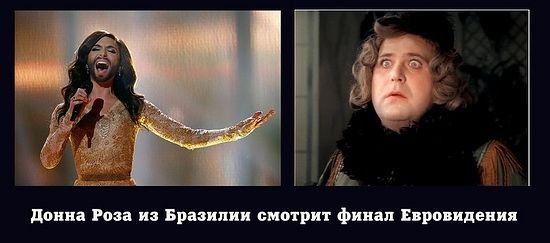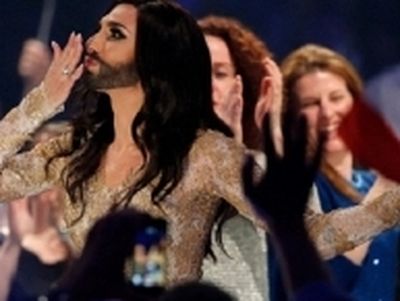The victory at the Eurovision contest of “bearded woman” Conchita Wurst has evoked stormy popular reaction ranging from ecstasy to utter disgust. The different sides are energetically discussing the event, and each other’s reaction to it.
Deputy of the “One Russia” party Olga Batalina expressed her extreme anxiety over the intensification of gay propaganda. Philip Kirokorov [a pop star in Russia and former participant in Eurovision] called all to respect the winner.
The Latvian nationalist Raivis Dzintars saw “Putin’s hand” in this: “One could argue that Conchita Wurst is a PR invention of Putin. It’s impossible to imagine a better gift to Putin in the information war.”
“This is yet another link in the chain of cultural legitimization of vice in the modern world, an attempt to establish new cultural norms in society. The process of legalization of what the Bible calls nothing other than an abomination has long ago ceased to be news in the modern world. Unfortunately, tendencies in the fields of both legislature and culture are moving along parallel lines, and the results of this contest testifies to that,” comments the head of the Synodal information department for the Russian Orthodox Church, Vladimir Legoida.
“At first glance it’s hard to understand why there was such an uproar. There are men dressed as women every weekend on television, and at all the gala concerts you’ll see Verka Serduchka [female stage persona of Andrei Danilko, a stand-up comedian from Poltava, Ukraine]. You’ve never seen a woman with a beard? By the way, the phenomenon of the bearded woman is something widely known in world culture and Russian culture,” the popular publicist Valery Paniushkin expresses his perplexity and cites more examples of popular bearded woman from the last century. Even Yury Denisov on Lenta.ru [a well known Russian news site] insists that bearded women are traditional.
Well, maybe that’s true—what’s our problem? Why the ruckus? What makes us react so strongly to what would appear to be just another cheap vaudeville show? Let’s think about this.
First of all, let’s get rid of the false targets presented to us by the liberal press—“bearded women” past and present, by which they try to confuse us, not giving us a correct assessment of what has happened.
The root difference between the bearded women of medieval times and Conchita Wurst consists in the fact that, first of all, Conchita Wurst is not a woman. He’s a man. Secondly, the bearded women of the past were looked on as freaks, while Conchita Wurst is now considered by modern Europe as a pinnacle of their civilization.
When Kalyagin [a famous Soviet film actor] sings “Love and Poverty” in the role of Donna Rosa de Alvadorez, or when Dustin Hoffman plays “Toostsie” it is in the first place funny, and in the second place intended to explain to the audience the essence of love and camaraderie, and show the relationship between wealth and poverty.
When it comes to Conchita, there is nothing funny about it. To the contrary, it is all beastly serious.
At the announcement of the contest results, the “female artist” wept and gave a speech:
“This evening is dedicated to all who believe in the future of peace and freedom. You know who you are: we are one, and we cannot be stopped. This is a celebration for all. It is for all those who believe in a future where there will be peace, love, tolerance, and where people will be accepted for what they are.”
Later the “female artist” addressed the President of Russia:
“I don’t know if he is watching… But if he is, it seems I have already said it clearly: we cannot be stopped!”
It sends chills up your spine. Who “cannot be stopped”? What are they—legion?
The medieval bearded women midgets who worked as jesters and circus actors, and Kalyagin and Hoffman dressed as ladies, made no such claims. They did not make them, for obvious reasons: the former were in no position to do so, and the latter were not dressing up as women for that reason.
Let’s take Conchita at his word and accept it as a given that he is talking precisely about freedom and about the fact that the followers of this freedom cannot be stopped.
I think that the Christian world’s morbid reaction to Conchita Wurst’s triumph shows just this difference between the understandings of such concepts as freedom for Christians, and freedom for those whose hero, if not to say, “icon”, is Wurst.
Furthermore, I suspect that this very conflict is right now the greatest conflict of mankind; and the resolution of this conflict, to put it more exactly, will determine the world’s future.
Our problem is that our opponents are trying very hard to keep the essence of this conflict under wraps, and we ourselves for some reason—perhaps by force of prejudices in which Christians also abound—do not bring the essence of the conflict out for society to judge. Or perhaps we are hiding this essence from ourselves—something even worse and more dangerous.
As I see it, in one way or another the time has come to call a spade a spade, to give people real knowledge about the world they live in, and about its global conflicts. Only in this way can we receive their support and a real, conscious and free choice in our favor.
Thus, we are talking about an ancient conflict between two concepts of freedom, which in turn comes from differing understandings of man’s essence—an understanding based upon an even more fundamental difference: the difference in understandings of the role of God, material, and spirit.
It would seem to be a long stretch from this to a feminine looking man winning a music contest, but in fact the road between them is very short.
The Christian worldview is based upon the premise that man was created by God, and in His image. And God is the Father, Creator, Love, Truth, and Life. God is all-good, omnipotent and omniscient, and the world He created—to cite the words of the Creator Himself—is “very good”.
The Christian worldview presupposes the presence of God’s Providence for the entire world and mankind as a whole, as well as for each person individually. Everyone in life has his or her own significance and aim. Even more: as the classic says, “You know, there is always room for struggle and labor.” Someones’ struggles and labors are “just like everyone else’s”, while others’ may be more unique, but the result should be what Orthodox Christians call the “deification” of man—that is, his drawing ever nearer to the state of perfection in which God abides.
Be ye therefore perfect, as your Father in Heaven in perfect (Mt. 5:48).
To draw ever nearer to the One Who is Love and Truth.
Furthermore, the world created by God, the laws of life He established, and we ourselves are His images—all this is cause for struggle and labor. By this I mean the activity that results in profound change in a person, in his beneficial spiritual growth. A very simple example of this is the change from boyhood to manhood—a change that is achieved through love for a woman and the bearing of all those burdens and limitations that come with it.
Our freedom has meaning—the achievement and embodiment on our life path of God’s Providence for us, turning us from something that “drags out an existence” into something that is truly alive, the being that God intended us to be.
A Christian’s highest achievement is the ability to unite himself entirely to God: Not my will, but thine, be done (Lk. 22:42). Freedom is not an end in itself, but the necessary condition or instrument needed for self-development, for learning to love people, life, and peace, for establishing ever newer connections with people, strengthening old ties, and for the sake of their preservation, doing what was considered impossible. This transforms us and brings us closer to God.
Love for a woman is a unique gift that awakens in us this ability to love, struggle and labor, and be transformed:
But we can’t stop these mad ones.
They are ready to pay any price,
They would risk their lives,
To keep that magical, invisible thread
From tearing; to save the thread
That they’ve threaded between them.
Vladimir Vysotsky. Ballad of Love
In the world that gave us Conchita Wurst, it’s all different. There is a different idea of man and his freedom.
From the very moment that “contestant Wurst” appeared on Eurovision it was clear that “she” would definitely be the winner. There was in fact no intrigue—something quite clearly reflected in the bets of the bookies. It was practically a foregone conclusion.
Why?
Because Wurst was able to create for himself the nearly ideal symbol of a concept of human freedom that fits within the framework of the new morality currently being offered to humanity.
The image created by Wurst is a ritual, public derision of woman and man. It is not even the desire of a man to become a woman—if that were the case, there would be no need for a beard. It is precisely a derision of the normal concept of feminine esthetics, of the traditional understanding of feminine beauty. This spectacle was consciously preprogrammed to evoke repugnance in people who have no deviations developing in them.
In this way, two tasks are solved.
1. It becomes morally untenable for people with a normal [sexual] orientation to exist in a society where esthetics of the unacceptable, repulsive image created by Wurst are being propagated, and so they are forced by pervasive pressure to change their convictions. It is like the experiment with the black and white pyramid.
The author is citing an experiment conducted on schoolchildren and young adults. Two pyramids are placed on a table, one black, and one white. The group is coached to say that both pyramids are white. When a student who knows nothing about those instructions is brought in and asked the same question, but only after all the others had answered that both pyramids were white, the new student would in most cases likewise answer, “They are both white.” The experimenter would then ask that student to take the black one in his hands, and seeing it unhesitatingly taken, would ask why the student had said that both the pyramids were white when they clearly recognized one as black. These students could not adequately answer that question.
The conclusion drawn from this experiment is that people place conformity to the group higher than the truth, and are willing to sacrifice their own reason and conviction only to be “like everyone else”.
2. It is a demonstration of their own belief, a public confession of it. This belief consists in the denial of the presence in oneself of any external meaning, of one’s likeness to God. In this values system, God is either absent from man or at enmity with him. And the material world, including one’s own body, becomes not a gift of existence, a gift of life, but a possession or a prison, contemptible flesh. One’s own life becomes not an ascent, but a brief spark of consciousness between the eternities of non-existence or torment. Any of these variations leads to the growth of a cult of death and its accompanying culture of violating one’s own body—from harmless tattoos and piercings to the most defacing, radical forms.
Conchita Wurst’s performance is also a ritual of violation against one’s own body. It is a ritual rejection of God’s gifts—the gift of meaning, the gift of life. It is the manifesto of militant inadequacy.
With a little stretch it could be said that this ideology enjoys the constant and systematic support of the Western establishment. What is the reason for such beneficence towards it?
Capitalism and the thirst for material gain have met a roadblock on their path preventing them from spreading out any further. The earth’s sphere has reached it end. Capitalism has bitten onto its own tail like a snake and is swallowing itself right before our eyes. Globalization is destroying the neocolonial system, and the world order it created along with it. Nevertheless, it still has a way to preserve itself as the dominant system on the planet, and it would follow, to preserve its upper crust, the financial elite. To do this, capitalism must expand its markets and sphere of services not through technological progress or geographical warfare, but by penetrating into those spheres of human life that had never before been markets or merchandise—into the human body, family, love, children, personal development, and consciousness.
But for this, man has to completely give up Christianity and start viewing himself and his neighbor not as the image and likeness of God, the inimitable source of creativity, love, and constructive endeavor, but as merchandise, an object for consumption, and a consumer. It is a complete and boundless freedom from ties, God, love, destiny, and conscience—a world in which the words of St. Theophan the Recluse, “Faith will weaken, love will dry up, and the world will become constricting”, will be an everyday reality.
In other words, their idea of ideal freedom in the world entirely corresponds to our picture of the reign of antichrist. And they in all honestly warn us about this by their advertisement of the world they have created, and its new ideology.








